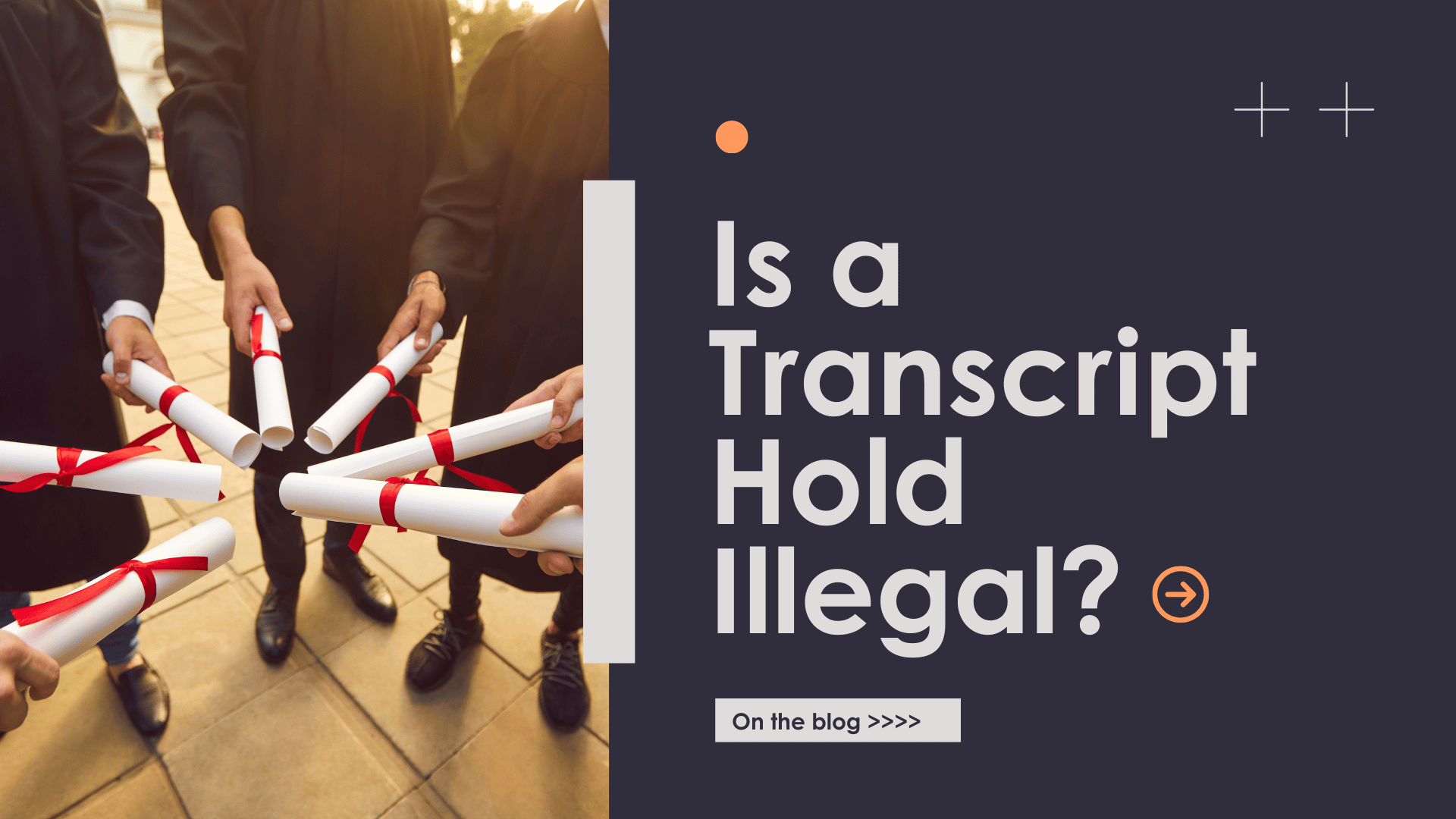What happens when your future is stuck behind a locked transcript?
For many students, a transcript hold feels like an invisible wall standing between them and their goals. Whether it’s unpaid tuition, a missing library book, or incomplete paperwork, transcript holds can throw a wrench in your plans to graduate, transfer, or even land that dream job. But with new regulations on the horizon, including the transcript withholding law of 2024, the rules are changing—and it’s important to know how these changes might affect you and your academic journey.
In this blog, we’ll explore what transcript holds mean, why they happen, and how recent federal and state laws are reshaping the landscape for students across the U.S.
Understanding Transcript Holds
Before we get into the nitty-gritty of the new transcript hold law, it helps to understand what a transcript hold actually means and why colleges use it in the first place.
What Is a Transcript Hold?
Think of a transcript held as a big “pause” button on your academic transcripts.
When your transcript is on hold, you won’t be able to access your official academic history until the issue behind the hold gets resolved.
The most common reason for a hold for a degree transcript? Unpaid balances. But it’s not just about tuition.
Schools might put a hold on your transcript if you:
- Didn’t return borrowed items (like textbooks, library books, or lab equipment)
- Have missing documents (think: proof of residency, health records, or updated contact info)
- Are on academic probation and haven’t met specific requirements
Some schools enforce partial transcript holds, meaning they may still provide a transcript but with certain details omitted.
For example, they might suppress final grades or degree conferral information until the balance is cleared. In some cases, institutions issue partial transcripts, releasing only a portion of a student’s academic history (e.g., undergraduate vs. graduate records).
Is It Illegal to Withhold Transcripts?
It depends on the situation and your state’s laws.
The transcript withholding law 2024 changes things at the federal level by prohibiting colleges from withholding transcripts for unpaid balances tied to Title IV federal aid. However, in some cases, schools may still legally enforce transcript holds.
State laws also come into play here. For example, California and New Jersey already have bans on transcript withholding for unpaid fees.
But in states like Texas and Florida, schools may have more discretion over whether to withhold transcripts. Understanding the specifics of both federal and state laws can help you navigate your options.
The Impact of Transcript Holds on Students
Transcript holds might seem like a minor inconvenience at first, but they can cause some serious ripple effects if left unresolved.
Effects on Academic Progression
Picture this: You’re ready to transfer schools, apply for a graduate program, or even land that dream internship — but you can’t prove you earned your credits because your transcript is locked behind a financial hold. Frustrating, right?
Without access to your transcript, you might miss critical application deadlines, delay your graduation, or lose out on scholarships and financial aid.
If your transcript is being withheld and you’re not sure why, it’s best to contact your registrar’s office as soon as possible to figure out the next steps.
Barriers to Further Education
Another tricky part about transcript holds is that they can block your path to future opportunities.
Many schools won’t accept transfer students without reviewing their prior academic records — and if your transcript is stuck on hold, you might be forced to start over from scratch.
Worse yet, some colleges deny admission to students with financial holds altogether. That’s why staying informed about transcript hold regulations and your school’s specific policies can make all the difference.
Legal Aspects of Withholding Transcripts
Can colleges hold transcripts indefinitely? What about unpaid balances from federal financial aid? Let’s look at the evolving legal landscape.
Department of Education Guidelines
Starting July 1, 2024, new Department of Education (DoE) regulations will limit when colleges and universities can withhold transcripts. These rules focus on ensuring students aren’t unfairly penalized due to administrative mistakes or financial aid delays.
Under the new law, schools cannot withhold transcripts if the balance results from:
-
Errors in Title IV fund administration (e.g., miscalculated aid, delayed disbursements).
-
Fraud or misconduct by the institution itself.
Schools must provide an official transcript for any payment period where:
-
The student received federal financial aid (Pell Grants, Direct Loans, etc.).
-
Institutional charges were fully paid or covered under an active payment plan (with at least one payment made).
However, there are exceptions:
-
Federal Work-Study payments made directly to students do not count toward covering balances.
-
Unpaid balances for non-Title IV charges (e.g., parking tickets, housing fees, conduct fines) are not covered under these regulations, meaning transcript holds may still apply.
Key Scenarios: Interpreting the New Rules
Navigating these regulations can get complicated, especially when payment periods, financial aid usage, and institutional policies are involved.
Based on transcript summaries and discussions, here are some common scenarios you may encounter:
-
Scenario 1: If a student owes a balance and doesn’t have a payment plan in place, schools may still be able to withhold the transcript.
-
Scenario 2: If the balance is due to errors on the institution’s part (like financial aid miscalculations), withholding the transcript is prohibited.
-
Scenario 3: Students with payment plans or loans set up for outstanding balances can still access their transcripts.
-
Scenario 4: If a student hasn’t received any Title IV federal aid, traditional transcript withholding rules may still apply.
These scenarios highlight how complex transcript withholding rules can be. Schools must carefully evaluate each student’s situation to comply with federal and state guidelines.
State-Specific Laws and Bans
Beyond federal rules, many states are introducing their own laws banning or restricting transcript withholding.
For example, California, New Jersey and Illinois already prohibit transcript holds for unpaid tuition or fees. These state-level reforms aim to give students more control over their educational records, especially when financial challenges are at play.
Transcript withholding regulations vary widely depending on where you live. Always check with your institution to understand your rights under both federal and state laws.
Read this article to get a better understanding about transcript hold laws in different U.S. states. :- Here Are the States That Ban Colleges From Withholding Transcripts
Navigating Financial Holds
Dealing with a financial hold can feel overwhelming, but there are practical ways to handle it — even if you’re unsure where to start.
Understanding Withholding for Non-Payment
In the past, many colleges used transcript holds as leverage to collect unpaid debts. If you had outstanding tuition, parking fines, or even dorm fees, your transcript could be put on ice until the balance was paid in full.
But under the new transcript withholding law 2024, this practice will change for federally funded balances.
If your debt is tied to federal financial aid, your school won’t be able to hold your transcript just because you haven’t paid off your bill.
Disputing a Financial Hold
Sometimes, these holds aren’t as straightforward as they seem.
Maybe there’s been a miscommunication about what you owe, a clerical error, or even an unresolved issue you didn’t know about. Other times, you may simply be unsure of your options or how to navigate the process.
Whatever the case, taking a proactive approach—reviewing your account, gathering evidence, and reaching out to the right people—can make all the difference.
In this section, we’ll guide you through a step-by-step plan to dispute a financial hold effectively.
-
Review Your Account: Log into your student portal and check for any outstanding balances or missing documents.
-
Gather Evidence: Collect any relevant paperwork, like payment receipts, emails, or notices from your school.
-
Contact the Right Office: Reach out to your financial aid office or registrar’s office to explain your situation and request clarification.
-
Seek Support: If the issue isn’t resolved, consider speaking with a supervisor or contacting a student advocacy group for additional guidance.
Strategies for Resolving Transcript Holds
Transcript holds aren’t permanent. With the right approach, you can unlock that door, regain access to your records, and move forward.
Whether the hold is due to unpaid balances, missing paperwork, or unresolved academic issues, there are practical strategies that can help you take control of the situation.
In this section, we’ll explore specific, actionable strategies to help you navigate the process effectively. By taking a proactive approach and communicating clearly with your institution, you can minimize delays and increase your chances of a positive outcome.
Let’s break it down.
Practical Strategies To Pursue
While transcript holds can be frustrating, there are ways to resolve them:
-
Partial Transcript Holds: Schools may still withhold grades for unpaid periods, but they must show course details (such as course names and credits).
-
Payment Plan Options: If you enroll in a payment plan, your school may require at least one installment before releasing your transcript.
-
Appeal for Institutional Errors: If you suspect your balance is due to an error in financial aid processing, ask the registrar to review your case.
Proactively communicating with your school’s registrar, financial aid office, or bursar can prevent long-term delays in accessing your transcript.
Communicating with Academic Institutions
The key is understanding why your transcript is on hold and figuring out the best way to address the issue. If you believe your transcript is being unfairly withheld, you should:
-
Request Documentation – Ask your school for a clear breakdown of your balance and whether Title IV funds were involved.
-
Negotiate Payment Plans – If applicable, making even one payment on a plan may allow your transcript to be released.
-
Know State vs. Federal Laws – If your state has stricter rules, your school must comply with both federal and state laws.
When reaching out to your school, be polite, clear, and direct. Ask questions like:
- What’s causing the hold on my transcript?
- Are there any payment plans or financial aid options available to help me resolve the balance?
- Can I access my unofficial transcript while the hold is in place?
Document everything — from email exchanges to phone call notes — in case you need to escalate your case later.
When to Request Academic Records
Deciding when to request your transcript depends on your situation.
If you’re applying for jobs or transferring schools, you might wonder, “Should I send my transcript now or hold for grades?”
If recent grades aren’t a deal-breaker, it may be better to request your transcript sooner rather than later — especially with the transcript withholding ban taking effect.
Potential Reforms and Future Changes
The landscape of transcript withholding is shifting, with new regulations aiming to protect students’ rights and promote transparency.
Transcript hold policies are undergoing a significant transformation, and more changes may be on the horizon.
With the introduction of the transcript withholding ban of 2024, which limits how colleges and universities can withhold transcripts due to unpaid balances, schools are already adjusting their administrative practices.
But this is just the beginning. Future reforms could bring even stricter oversight, new student protections, and additional guidelines designed to balance institutional needs with students’ rights.
Changing Landscape of Transcript Policies
As colleges adapt to the transcript withholding law 2024, you’ll likely notice updates to their policies.
Schools may implement alternative strategies for managing unpaid balances without restricting access to transcripts.
At the heart of these changes is the push for transparency and fairness. Many students have faced setbacks in their academic or professional journeys simply because their transcripts were held hostage over unpaid tuition, parking fines, or even minor administrative issues.
Anticipating New Regulations in Education
Future reforms may introduce even stricter oversight of how colleges handle student finances, along with expanded protections for students navigating financial hardship. Staying informed about these changes can help you advocate for your educational rights and plan ahead.
Stay up-to-date on the latest transcript withholding regulations, know your options, and don’t be afraid to ask for help when you need it. Your academic journey is yours to control — and your transcript is just one chapter in the story.
In the coming years, you may see further shifts in how educational institutions manage unpaid student balances. Some reforms might require schools to explore alternatives, such as flexible repayment plans, enhanced financial counseling, and better communication around student debts.
These efforts aim to reduce financial stress on students while helping schools maintain financial stability. Staying informed about these changes will be crucial for navigating the evolving landscape and advocating for your educational rights.
Preventing Transcript Withholding with EduTranscript
Transcript holds have traditionally ensured financial accountability, but in today’s landscape, they can do more harm than good—blocking students from jobs, graduate programs, or credit transfers.
As state laws evolve and public scrutiny increases, registrars must balance institutional policies with ethical and legal considerations.
Without a structured approach, transcript withholding can trap students in financial limbo, making it harder to resolve their obligations while exposing universities to compliance risks.
EduTranscript offers a smarter way forward.
It enables universities to implement conditional transcript release for job or graduate school applications, provides students with access to unofficial transcripts, and automates compliance with state-specific regulations.
With built-in hold resolution guidance, students receive clear instructions on settling their accounts, helping institutions recover funds without unnecessary barriers.
By adopting a balanced approach, registrars can maintain institutional integrity while ensuring students have a path forward—without being unfairly held back.
Conclusion
Transcript holds can feel like frustrating roadblocks, but they don’t have to stop students from moving forward.
Whether it’s an unpaid balance or missing paperwork, the best way to resolve a hold is to stay informed and take action. By understanding why transcript holds happen and the new laws—like the federal transcript withholding law of 2024—students can find solutions and keep their education on track.
For students, communication is key. Asking questions, setting up payment plans, and knowing state protections can make a big difference. Keeping records of conversations with the registrar or financial aid office can help avoid delays. It’s not just about clearing a hold—it’s about knowing your rights and planning ahead.
For college registrars, balancing institutional policies with student success is a challenge—but the right tools can help. EduTranscript offers a secure and compliant way to manage transcript requests, with automated processing and conditional transcript release to prevent unnecessary barriers. This ensures students can access their records for jobs or transfers while schools maintain financial accountability.
Want to see how it works? Book a free demo today to simplify transcript management and stay compliant with evolving regulations.
.png)
 Author :
Author : 




